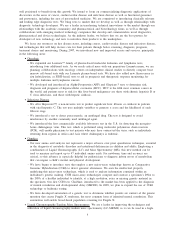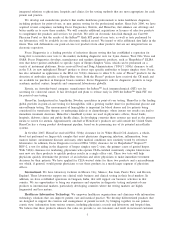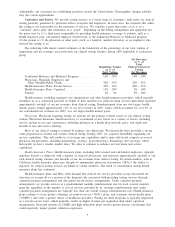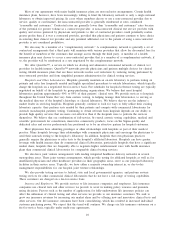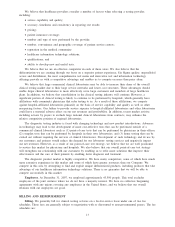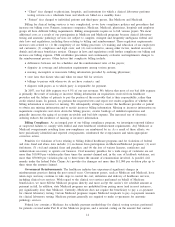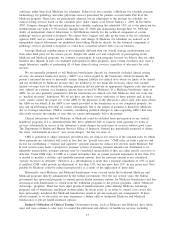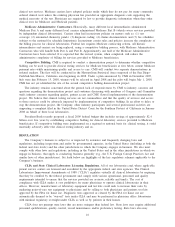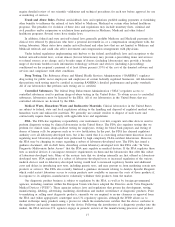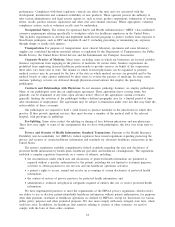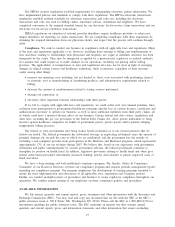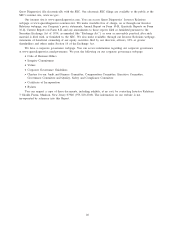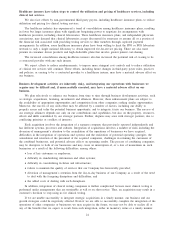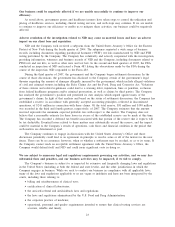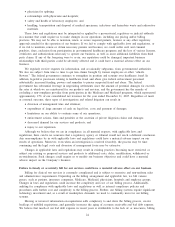Quest Diagnostics 2007 Annual Report Download - page 24
Download and view the complete annual report
Please find page 24 of the 2007 Quest Diagnostics annual report below. You can navigate through the pages in the report by either clicking on the pages listed below, or by using the keyword search tool below to find specific information within the annual report.could pay under their local Medicare fee schedules. Federal law also contains a Medicare fee schedule payment
methodology for pathology and other physician services performed for patients covered under Part B of the
Medicare program. These laws are periodically adjusted, but an adjustment to the national fee schedule for
clinical testing services based on the consumer price index cannot occur before January 1, 2009. In December
2007, Congress changed the national physician fee schedule, replacing the scheduled 10% cut to the physician fee
reimbursement rate with a 0.5% increase through June 30, 2008 and maintaining through June 30, 2008 the
ability of independent clinical laboratories to bill Medicare directly for the technical component of certain
pathology services provided to hospitals. We expect that Congress will take up the issue of the fee schedules
again in 2008, and we cannot predict whether they will change. If Medicare fee schedules are reduced, or if
independent clinical laboratories are prohibited from billing Medicare directly for the technical component of
pathology services provided to hospitals, it could have a material adverse effect on our business.
Average Medicare reimbursement is not materially different than our overall average reimbursement rate
from other third party fee for service payers. Despite the added cost and complexity of participating in the
Medicare and Medicaid programs, we continue to participate in such programs because we believe that our other
business may depend, in part, on continued participation in these programs, since certain customers may want a
single laboratory capable of performing all of their clinical testing services, regardless of who pays for such
services.
We are generally permitted to bill Medicare beneficiaries directly for statutorily excluded clinical testing
services. An advance beneficiary notice (“ABN”) is a notice signed by the beneficiary which documents the
patient’s informed decision to personally assume financial liability for clinical tests which are likely to be denied
and not reimbursed by Medicare because they are deemed to be not medically necessary (these tests include
limited coverage tests for which the ordering physician did not provide an appropriate diagnosis code and certain
tests ordered on a patient at a frequency greater than covered by Medicare). If a Medicare beneficiary signs an
ABN, we are also generally permitted to bill the beneficiary for clinical tests that Medicare does not cover due
to “medical necessity” limitations. We do not have any direct contact with most of these patients and, in such
cases, cannot control the proper use of the ABN by the physician or the physician’s office staff, who must obtain
the ABN on our behalf. If the ABN is not timely provided to the beneficiary or is not completed properly, we
may end up performing tests that we cannot subsequently bill to the patient if payment is denied by Medicare
due to coverage limitations. CMS is currently considering potential changes to rules regarding ABN’s that may
effectively increase the number of tests that we cannot subsequently bill to the patient.
Clinical laboratories that bill Medicare or Medicaid could be excluded from participation in any federal
healthcare programs if it is determined that they have submitted bills or requests from payment for items or
services substantially in excess of the laboratory’s usual charges for such items or services without good cause.
The Department of Health and Human Services Office of Inspector General has periodically proposed to define
the terms “substantially in excess” and “usual charges,” but has not done so.
CMS is permitted to adjust statutorily prescribed fees for clinical test services if the standard rules by which
those payments are calculated will result in fees that are “grossly excessive.” CMS rules set forth a process and
factors for establishing a “realistic and equitable” payment amount for clinical test services under Medicare Part
B (and services paid under a prospective payment system) if existing payment amounts are determined to be
inherently unreasonable; payment amounts may be considered unreasonable if they are either grossly excessive or
deficient. Under CMS rules, if CMS or a carrier determines that an overall payment adjustment of less than 15%
is needed to produce a realistic and equitable payment amount, then the payment amount is not considered
“grossly excessive or deficient.” However, if a determination is made that a payment adjustment of 15% or more
is justified, CMS could provide an adjustment of less than 15%, but not more than 15%, in any given year. Fees
payable by Medicare could be reduced prospectively as a result of the application of these rules.
Historically, most Medicare and Medicaid beneficiaries were covered under the traditional Medicare and
Medicaid programs directly administered by the federal government. Over the last several years, the federal
government has sponsored programs to expand private health insurance options for Medicare beneficiaries and has
encouraged such beneficiaries to switch from the traditional programs to the private programs, called “Medicare
Advantage” programs. There has been rapid growth of health insurance plans offering Medicare Advantage
programs and of beneficiary enrollment in these plans. In recent years, in an effort to control costs, states also
have increasingly mandated that Medicaid beneficiaries enroll in private managed care arrangements. If these
efforts continue to be successful, we may experience a further shift of traditional Medicare and Medicaid
beneficiaries to private health insurance options.
Reduced Utilization of Clinical Testing. Government payers, such as Medicare and Medicaid, have taken
steps and may continue to take steps to control the utilization and delivery of healthcare services, including
15


